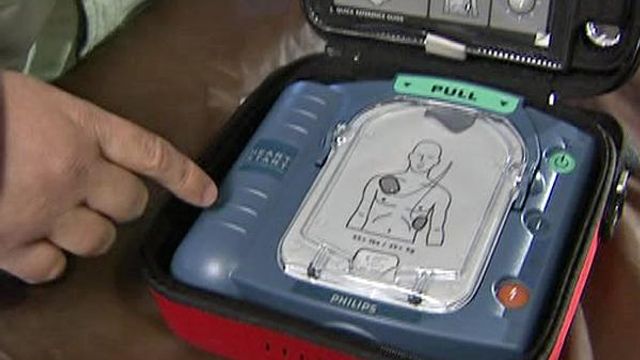Durham man suffers from hypertrophic cardiomyopathy
Gaines Adams had hypertrophic cardiomyopathy, a thickening of the heart muscle that makes it difficult for the heart to pump blood. He died in his home in Greenville, S.C.
Posted — UpdatedAdams' story grabbed the attention of a Durham police officer who nearly experienced the same fate.
In August of last year, Gerry Elliott was directing game traffic in front of the Durham Bulls Athletic Park.
“I remember taking a step to walk out of the intersection and everything went white,” Elliott said.
He fell and a fellow officer caught him.
“He told me he rolled me over and when he rolled me over, my complexion was kind of grayish blue and my lips were dark blue,” Elliott recalled.
Elliott's heart stopped beating. An EMT grabbed an automatic external defibrillator (AED) from the park's office, and shocked his heart back to life.
“This is the one that saved my life,” Elliott said.
Elliott learned that he had a heart condition that had never been revealed through a physical exam.
“Hypertrophic cardiomyopathy, which is basically an enlarged heart,” Elliott said.
A quick response and the AED saved Elliott's life. Because AED's cost more than $1,000, many churches, schools and businesses don't buy them.
But the Durham Bulls Athletic Park has one, and during games, several EMT crews carry them. Even officers are trained to use them.
“We call them idiot proof, I mean, they basically show you where to put the pads, you hit a button and step back and it tells you what to do next,” Elliott said.
Elliott is now on light duty with the police force and about to begin medical retirement. He has an implantable electronic defibrillator in case his heart stops or goes out of rhythm.
“I used to believe in luck, but now I just believe that I'm really blessed. I really do,” he said.
There are usually no symptoms for hypertrophic cardiomyopathy. Typical physical exams may not spot the problem.
Hypertrophic cardiomyopathy is also a hereditary disease, so Elliott had everyone in his family checked. He discovered that his father has the same condition and as a result, he keeps a closer watch on his health.
• Credits
Copyright 2024 by Capitol Broadcasting Company. All rights reserved. This material may not be published, broadcast, rewritten or redistributed.





